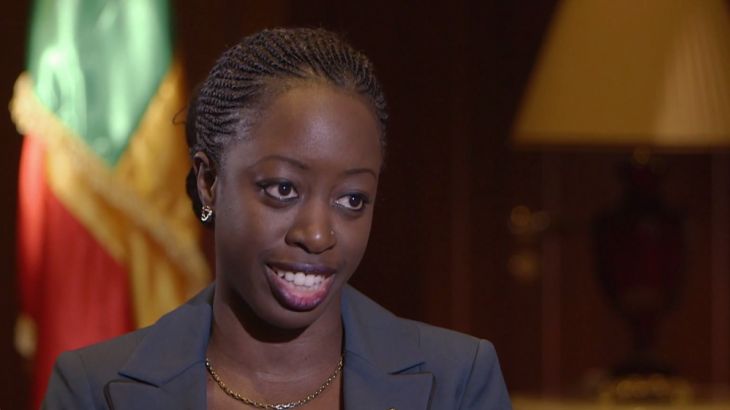
Mali FM Kamissa Camara on rebels, human rights and Sahel security
Mali’s foreign minister discusses the struggle for regional security, alleged human rights violations and resilience.
The peace treaty signed by government leaders and separatist rebels in Mali in 2015 was meant to usher in a new era of peace and stability in the northwest African country.
But progress in implementing the agreement has been slow and insecurity has grown. The violence that began with the uprising and seizure of territory in the North has now spread into previously stable central Mali.
Keep reading
list of 4 itemsGunmen kill at least 11 in two attacks in Pakistan’s Balochistan
Pakistan slams Indian minister’s remarks on pursuing suspects across border
Rights advocates demand end to Haiti deportations as unrest continues
Armed groups have taken advantage of inter-ethnic grievances and local resentment towards the government to spread fear and chaos, forcing thousands to flee.
President Ibrahim Boubacar Keita, who has ruled since 2013, was re-elected in August 2018 for a second term. He announced a government reshuffle aimed at restoring peace, stability and foreign investment – all important to boost the economy and reduce poverty. As part of the reshuffle, Kamissa Camara was appointed Mali’s new minister of foreign affairs.
Is the 35-year-old’s appointment the beginning of comprehensive institutional reforms? And with armed groups reorganising and extending violence from the northern to the central regions of the country, how can peace be achieved in the foreseeable future?
“There is a terrorist issue in the Sahel region and also in the world,” Camara tells Al Jazeera. “It’s really difficult, or I would say even inaccurate, to take the significant issues of Mali out of the issues of the Sahel region. The terrorist issue is not a Malian issue. We have been experiencing it all over the world.”
While she confirms that there’s intercommunal violence, Camara says the situation “cannot be simply described as a terrorist situation … It’s a pastoralist issue between Fulani herders that are against Bozo herders … It’s a complex security situation that has been exacerbated by terrorist groups, that has been utilised by terrorist groups so now it is being perceived as an ethnic conflict, which is not necessarily the root of it.”
In 2017, five Sahel countries, including Mali, joined forces to establish a multinational security force with the aim of defeating armed groups in the region. More than a year after it was set up, this G5 Sahel force has yet to fully become operational.
Among other factors, Camara says, “there’s definitely a lack of funding for the joint force to be fully operational. We currently have need of over 400 million euros per year [roughly $458m]. For now it’s our job to make sure that the international community understands that this joint force is the only sustainable solution we currently have in order to curtail the fragile security situation that we have in the Sahel region.
“We are trying to find solutions to our own problems, and this is what the international community has been pushing African countries to do … What we are trying to do is for five Sahel countries that are facing the same security issues, to work together in order to curtail a growing terrorist threat.”
Mali’s increasing security challenges have also affected the human rights situation in the country. In October 2018, UN human rights expert, Alioune Tine, stated that “the Malian state has not fulfilled its sovereign role in protecting property and people, and bringing perpetrators of criminal acts to justice.”
Asked about a new Al Jazeera report from the Mali-Mauritania border in which some Malians who had left accuse Malian soldiers of going through their villages, pillaging, and harassing them, Camara says: “I have never heard of such a thing. Never.” But, she says, “we are definitely always willing to investigate.”
“Human rights violations are alleged violations until they’re proven right. And the Malian government does take this issue very seriously. We do have teams on the ground. We do investigate. We also work with local society organisations to make sure that any accusations that we are hearing about are accurate. Again, we take this issue very seriously, and measures are being taken.”
Despite regional security challenges, Mali’s gross domestic product (GDP) growth is stable at around six percent and there’s been a rise in agricultural productivity. The IMF and World Bank continue to support Mali financially.
“Mali is a very resilient country,” says Camara. “Mali has gone through a lot since 2011. We have … gone through a military coup, an insurgency, but we also have had a lot of successes. We organised two peaceful presidential elections. We have a peace process that is ongoing. We have the DDR [disarmament, demobilisation and reintegration programme] that just started. We have a full ministry in charge of the peace process. We have a six percent growth rate …”
“Despite the security challenges that we currently have, we’re a country that is ready for investments and, we are ready to take charge of all of the issues that we’re currently having, we’re finding solutions to them,” says Camara, who wants to ensure that “the international community understands that the issues of Mali are not necessarily focused on the security aspect of it, that we have potential. That we have things to offer.”